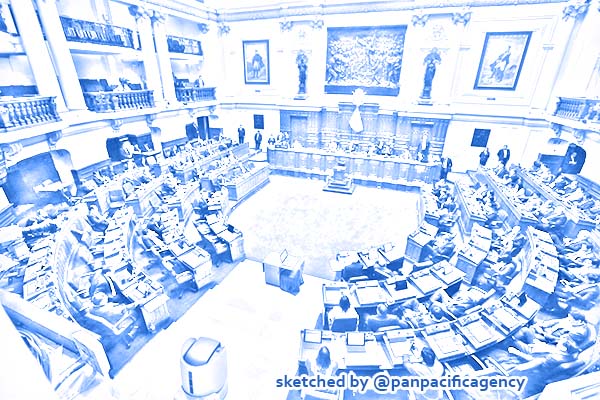Peru Congress approves end of immunity for legislators and senior public officials

Congress of Peru. Photo by the ANDINA. Sketched by the Pan Pacific Agency.
LIMA, Jul 7, 2020, ANDINA. The Peruvian Congress on Sunday night approved the constitutional reform bill that eliminates parliamentary immunity and introduced changes in the treatment to senior public officials, including the President of the Republic, ANDINA reported.
Made in a virtual session, the decision received 110 votes in favor and 13 against. Besides, it came after the Government announced a referendum on the topic for 2021.
The parties Accion Popular (Popular Action), Somos Peru (We are Peru), Alianza para el Progreso (Alliance for Progress), the Agricultural People’s Front of Peru (Frepap), Union por el Peru (Unity for Peru), Podemos Peru (We can, Peru), and Somos Peru (We are Peru) voted unanimously in favor of it.
Meanwhile, 9 members of Fuerza Popular (Popular Force) voted in favor and 5 against. In the case of Frente Amplio (Wide Front) one member voted against and six in favor. Finally, most lawmakers in Partido Morado (Purple Party) voted against.
The substitute text of the approved decision modifies articles 93, 99, 117, 161 and 201 of the Constitution, and specifies, in the first case, that legislators represent the Nation and are not subject to imperative mandate or questioning.
In addition, it states that “they are not responsible — to any authority or judicial body— for the opinions and votes they cast or for the legislative, representative, oversight, political control actions, among others, inherent in the parliamentary work carried out in the exercise of its functions.”
It also provides that criminal proceedings in respect of common crimes committed by lawmakers during their tenure are the exclusive responsibility of the Supreme Court.
Article 99 has been amended, too. It now states that the Permanent Commission is responsible for accusing —before Congress— the President of the Republic, lawmakers, members of the Constitutional Court, the National Justice Board, the Supreme Court, Supreme Prosecutors, the Ombudsman, and the Comptroller General for violation of the Constitution and for all crimes committed while in office and until five years after leaving office.
The state ministers have no right to a political pre-trial procedure and do not enjoy any immunity while in office.
In addition, the text points out that Article 117 will state that during his term of office, the President of the Republic may be charged with committing high treason; preventing congressional, regional, or municipal elections; dissolving Congress, except in cases as set forth in article 134 of the Constitution; and preventing the meeting or operation of Congress, the National Election Board, or other bodies of the election system.
Moreover, the President of the Republic may be charged with committing crimes against the public administration during his tenure or before coming to office.
It must be noted that, in a televised address to the nation on Sunday afternoon, Peruvian President Martin Vizcarra had announced that he would call a referendum on the elimination of parliamentary immunity.
The Head of State affirmed that the popular vote would be held together with the general elections in 2021.